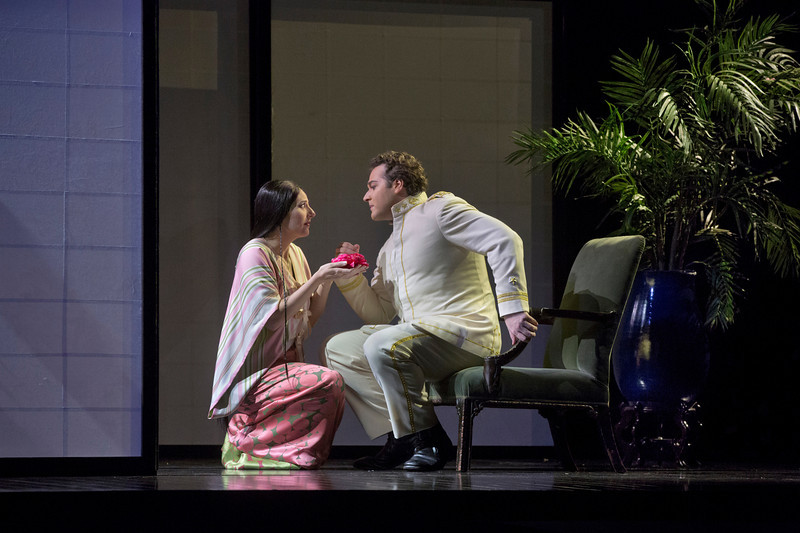With soprano’s strong debut, Met’s “Butterfly” takes wing

Amanda Echalaz and Bryan Hymel in Puccini’s “Madama Butterfly” at the Metropolitan Opera.
Photo: Ken Howard
Puccini’s Madama Butterfly, for all its tunefulness, can be a difficult opera to bring to life—taking place as it does under one roof for three (nominally two) acts, there is a very real danger of cabin fever.
Not so the Met’s version. Anthony Minghella’s 2006 staging, returning to the house on Thursday night, is a sleek and captivating affair, spare in its staging, but flexible enough to move seamlessly through space and time.
Singing only his second role at the Met (Aeneas in Les Troyens in 2012 was his debut), Bryan Hymel brought an astonishing sound to the role of the American sailor Pinkerton. Bright, clear, huge, this is a high-octane voice capable of taking on some of the most demanding roles in the Italian rep. He nailed every single one of his high notes without a blemish on Thursday, with power to spare.
Hymel was less convincing in his dramatic interpretation, which was not always imaginative. The purity of his tone in “Dovunque al mondo” was unbelievable, but his phrasing was flat. The tenor dug in with more abandon when the stakes were higher, as in the duet “Vogliatemi bene” to close the first act. The staging for this duet dissolves the house entirely, and dancers are brought onto a dark stage with paper lanterns, creating a sense of infinite space out of an intimate scene. There was nervous anticipation in Hymel’s voice, and he and his partner were sensitive to each other.
That partner was the South African soprano Amanda Echalaz, making her Met debut. She has received no small amount of praise for her Cio-Cio San elsewhere, and with good reason: Her voice rings throughout the house, but not with the sort of weight that can overpower an ingenue role. She enjoyed great freedom in her middle range and power in her chest, though some of her top notes got a little shrill, and perhaps it was for this reason that she sometimes shied away from them or cut them short. This didn’t stop her from giving a moving, bright-eyed rendition of the piece’s signature aria, “Un bel di.”
She was more hit than miss, dramatically, the misses being moments of violence (such as the half-hearted punches she threw at Goro) that looked poorly coached, more than anything else. She was utterly convincing in her pitiable naïveté and obsessive love for Pinkerton. Most of all, it was breathtaking to watch the depth of her relationship with her son, particularly in her death scene, which she sang with tremendous fervor.
That her connection to her son was so compelling is a testament to one of the production’s great feats of stagecraft: its use of Japanese Bunraku-inspired puppetry. The marvelous work of the Blind Summit Theatre makes “Sorrow” a mesmerizing presence onstage, at once otherworldly and devastatingly human. This final scene, however, is the only one in which the technique doesn’t quite work. The child’s handlers remain onstage with him and, for all their skill, they intrude upon Cio-Cio San’s final moment alone with her child.
Elizabeth DeShong was sensational in every regard as Cio-Cio San’s handmaiden, Suzuki. Fiercely devoted to and protective of her mistress, she was far and away the most compelling to watch of the actors onstage.
Thank goodness she has a voice to match—for pure power, she could go toe-to-toe with anyone else in the cast, but moreover she has a meaty tone that she could bring to a simmer in an instant. She infused it everywhere with powerful emotion, nowhere more than in her heart-rending laments of “Povera Butterfly!”
It must have been a whirlwind of a day for Marco Armiliato, who only found out at about one o’clock that he would be leading the performance, flying in from Chicago (where he is also conducting Butterfly) to replace the ailing Philippe Auguin without rehearsals.
In spite of all that, Armiliato’s direction on Thursday was simply inspired. (He’s conducted this work many times at the Met, and will be taking over full-time later in the run.) A few problems of ensemble can be forgiven, considering the circumstances. What matters is that he drew a bold, vibrant reading of the score, lush here, plucky there, brilliantly balanced and perfectly paced. He had the strings weaving pure silk, and the spare, mournful sound of the winds at the top of act three was hair-raising.
Scott Hendricks—another debut—brought a solid, slightly rough-around-the-edges sound to the role of the American Consul, Sharpless, visibly distraught by the situation and his complicity in it. Tony Stevenson was slick if not quite slimy enough as the matchmaker Goro, and Ryan Speedo Green boomed as the Bonze. Yet another debutante, Maya Lahyani was a picture of stoicism as Pinkerton’s American wife, Kate.
Madama Butterfly runs through May 9. Kristine Opolais, Maria Zifchak, and James Valenti will take the principal roles on April 4, with Marco Armiliato conducting. metoperafamily.org